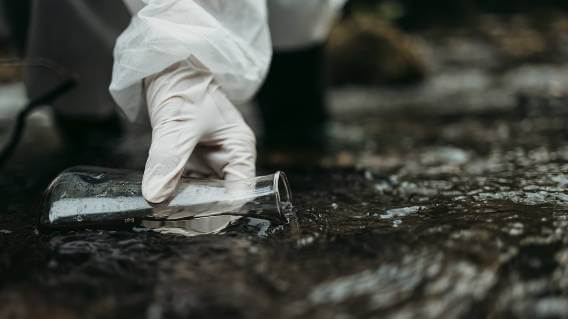Wait Continues for Camp Lejeune Veterans Who Filed Toxic Water Claims
Editors carefully fact-check all Drugwatch content for accuracy and quality.
Drugwatch has a stringent fact-checking process. It starts with our strict sourcing guidelines.
We only gather information from credible sources. This includes peer-reviewed medical journals, reputable media outlets, government reports, court records and interviews with qualified experts.

Camp Lejeune veterans and their families are still waiting for settlements they were promised over exposure to toxic water at the North Carolina Marine Corps base. Close to 100,000 claims have been filed with the Navy. So far, no settlements have been paid and fewer than a fifth of the claims have been processed.
Nearly 1 million people who lived and worked at Camp Lejeune between 1953 and 1987 may have been exposed to tainted drinking water. On-base leaks and spills, along with the mishandling of chemicals at an off-base business, caused the contamination. In August 2022, President Joe Biden signed the Camp Lejeune Justice Act into law, allowing legal action to be filed against the federal government.
“I mean, this is not what the president and Congress both intended when they passed the bill,” Mike Partain, a male breast cancer survivor who was born at Camp Lejeune, told CBS News.
Partain said his exposure began in 1968, the year he was born, because the baby formula he was fed was made with contaminated water.
“There’s over 130 men that I know of that have the single commonality of exposure to the contaminated drinking water at Camp Lejeune and male breast cancer,” Partain said.
According to a 2015 study by researchers at the Centers for Disease Control and Prevention, there are possible connections between exposure to the chemicals in the water at Camp Lejeune and male breast cancer. The tainted water is also linked to a number of other illnesses.
Camp Lejeune Claims Update
The Navy said it has started processing about 17,000 claims out of more than 93,000 received under the Camp Lejeune Justice Act. The Navy is also working to expedite the process by bringing in extra staff members and creating new IT solutions.
A U.S. Department of Justice spokesperson released this statement in July: “Alongside our partners at the Department of Navy, we are working to develop a framework that will allow for early resolution of Camp Lejeune Justice Act claims. This framework will offer claimants a voluntary option to resolve their claims efficiently if they choose to take advantage of it. The framework will provide an alternative to the normal administrative claims process or litigation so that those impacted can quickly receive relief.”
Federal judges in North Carolina who are overseeing all civil cases related to Camp Lejeune named a leadership team in July 2023 consisting of seven lawyers who are representing plaintiffs. The team will take certain cases to trial and suggest settlement amounts for specific medical conditions caused by exposure to the toxic water. Congressional projections suggest that compensation payout for victims could reach as much as $21 billion.
U.S. Sen. Marco Rubio called on the Navy in May to respond quicker to the large number of Camp Lejeune lawsuits. Rubio wrote a letter to Secretary of the Navy Carlos Del Toro asking about the delays and what could be done to speed up the process.
Health Issues Include Cancer, Parkinson’s Disease
Contaminated water at Camp Lejeune is responsible for a long list of serious health issues, according to the CDC. The agency can confirm cases of liver cancer, kidney cancer, bladder cancer, adult leukemia, multiple myeloma, non-Hodgkin lymphoma and Parkinson’s disease caused by the contamination.
Records show the water contained toxic chemicals such as perchloroethylene, trichloroethylene and benzene. In some cases the contamination was 300 times the acceptable level.
One study published in May in the Journal of the American Medical Association found that U.S. service members who were stationed at Camp Lejeune between 1975 and 1985 were 70% more likely to be diagnosed with Parkinson’s disease compared to those who were stationed in other parts of the country. The data used in the report came from the Veterans Health Administration and Medicare records.
Eddie Peterson, a 76-year-old former Marine who was stationed at Camp Lejeune, was diagnosed with Parkinson’s disease in 2001.
“A jury that hears this, they will be angry and we’re trying to send a message to the government that we’re not going to take this, you can’t ever take advantage of people like this,” Peterson told CNN. “It’s a crime against humanity. It’s a crime against everyone who was there who suffered like I have. Those that were in charge need to be held responsible for their misdeeds.”